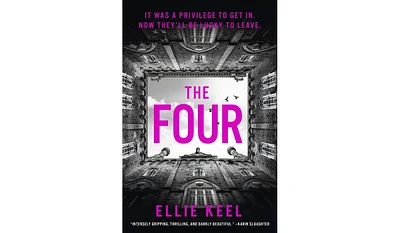Home
Larry Polansky: Four-Voice Canons
Loading Inventory...
Barnes and Noble
Larry Polansky: Four-Voice Canons
Current price: $20.99


Barnes and Noble
Larry Polansky: Four-Voice Canons
Current price: $20.99
Loading Inventory...
Size: OS
*Product Information may vary - to confirm product availability, pricing, and additional information please contact Barnes and Noble
This CD, released in December 2002, culls the fruits of 25 years of experimentation with the mensuration
canon
. Each piece features four voices entering in
form, each voice going through its line faster than the previous so that all four voices finish at the same time. To this centuries-old principle of time compression,
Larry Polansky
adds an extra rule where each voice goes through a permutational cycle of a small number of musical elements.
Four-Voice Canons
presents 16 of these works. The oldest (
"No. 4"
), was written in 1978-1979; the freshest (
"Nos. 14,"
"16,"
"17,"
and
"18"
) were completed in the summer of 2002 for this album. Variations in instruments (or sound sources in some cases) and the instrumentalists' dynamics, ranges, tones, and textures ensure that each piece has its own identity. Yet by the tenth track, the listener "gets the picture." It's time to hit the stop button and come back later. Some of these pieces have seen the light of day elsewhere (
"No. 10: Four Boys Mannin'"
on the
Frog Peak Collaborations Project
,
"No. 8: Nerve Canon"
on
Transforms: The Nerve Events Project
), but it was a good idea to put them all together. Highlights include
William Winant
's delicate marimba in
"No. 4,"
Polansky
's own fretless guitar playing in the intimate
"No. 17: Guitar Canon,"
the self-explanatory
"No. 14: Kid Canon,"
and the three different realizations of the composer's open score for
"No. 13: DIY Canon"
by
Daniel Goode
Nick Didkovsky
, and
Nathan Davis
. This album makes a slightly dry listen when taken in one gulp, but each piece has its fascinating quirks. ~ Francois Couture
canon
. Each piece features four voices entering in
form, each voice going through its line faster than the previous so that all four voices finish at the same time. To this centuries-old principle of time compression,
Larry Polansky
adds an extra rule where each voice goes through a permutational cycle of a small number of musical elements.
Four-Voice Canons
presents 16 of these works. The oldest (
"No. 4"
), was written in 1978-1979; the freshest (
"Nos. 14,"
"16,"
"17,"
and
"18"
) were completed in the summer of 2002 for this album. Variations in instruments (or sound sources in some cases) and the instrumentalists' dynamics, ranges, tones, and textures ensure that each piece has its own identity. Yet by the tenth track, the listener "gets the picture." It's time to hit the stop button and come back later. Some of these pieces have seen the light of day elsewhere (
"No. 10: Four Boys Mannin'"
on the
Frog Peak Collaborations Project
,
"No. 8: Nerve Canon"
on
Transforms: The Nerve Events Project
), but it was a good idea to put them all together. Highlights include
William Winant
's delicate marimba in
"No. 4,"
Polansky
's own fretless guitar playing in the intimate
"No. 17: Guitar Canon,"
the self-explanatory
"No. 14: Kid Canon,"
and the three different realizations of the composer's open score for
"No. 13: DIY Canon"
by
Daniel Goode
Nick Didkovsky
, and
Nathan Davis
. This album makes a slightly dry listen when taken in one gulp, but each piece has its fascinating quirks. ~ Francois Couture

















